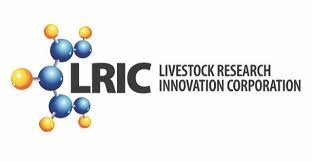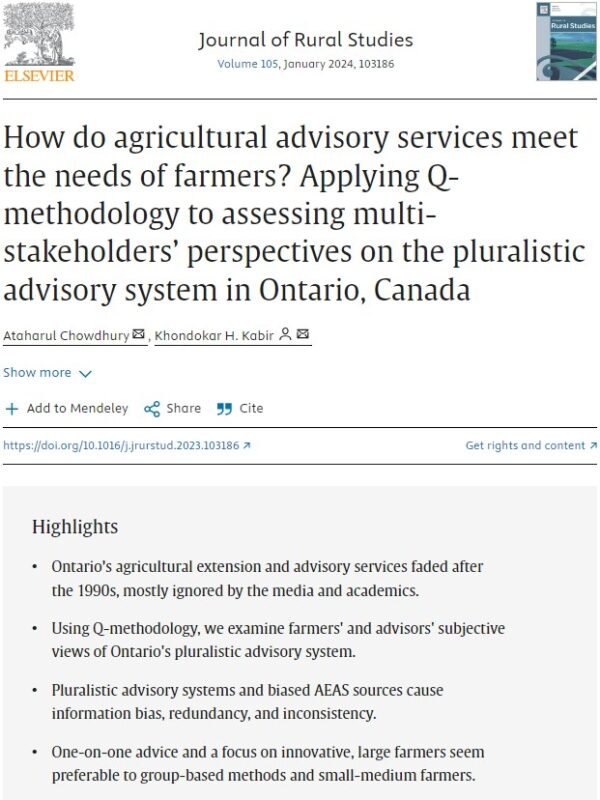Advisory Service in Ontario
Improving the effectiveness of advisory services for facilitating information sharing, accessibility and adoption of sustainable farm management practices in Ontario.
-
Overview
-
Forum Discussion
-
Report
-
Journal Publications
-
Advisory Service network maps
Ontario farmers have been facing challenges of receiving quality and needs-based services due to a lack of coordination and functional networks among agricultural advisory service providers and farmers. Therefore, it is necessary to understand how the current pluralistic advisory system in Ontario facilitates partnerships among relevant actors to provide quality service, and thus drive adoption by the target sectors and individuals in a timely manner. The present research aims to map out existing advisory service providers, their networks and partnership mechanisms, assess organizational capacity, quality of service and the effectiveness of the methods. This will be done by implementing stakeholder analysis, forums, surveys, and workshops in addition to drawing on the ‘best-fit’ approach toward assessing pluralistic agricultural advisory services. The research aims to generate enhanced understanding of the effectiveness of current advisory services for the adoption of sustainable management practices. This has included development of a strategy to improve pluralistic advisory service networks in Ontario using five main objectives, such as assessment of the organizational capacity of service providers to achieve their service goals as well as the quality and scope of services provided by different service providers.
Forum Discussion Series “What’s holding up advancing agricultural advisory services?”
What is holding up the advancement of agricultural extension and advisory service? The question begs critical attention and analysis of the current trends of agricultural extension and advisory service influenced by various ‘disruptive’ effects due to climate change, revolutionary use of digital technologies, and the emergence of various alternative movements, such as the circular economy (i.e. value-based agricultural economy created through waste prevention, eco-design, recycling, resource efficiency and re-use) and agriculture 4.0 (e.g. use of smart farming technologies, Internet of Things and Artificial Intelligence). The above transformative forces require that advisors and advisory organizations be well equipped to meet farmers’ changing needs and consider their actions within the emerging service delivery landscapes comprised of various stakeholders. In this forum discussion, we want to share, discuss and compare preliminary findings of an ongoing study, which focuses on soil/crop and livestock extension. The discussion will generate a better understanding of how the current extension and advisory service practices facilitate agricultural innovation and development processes in Ontario. By comparing the current practices with the global trend, we intend to articulate the transformative pathways of extension and advisory services in Ontario.
Part One
Date: April 9, 2021
Speakers and Discussants
Prof Dr. Klerkx Laurens, Wageningen University, The Netherlands
Prof. Dr. Andrea Knierim, University of Hohenheim, Germany
Dr Steve Roche, Director, ACER Consulting, Ontario, Canada
Mel Luymes, Co-founder, Ontario Soil Network, Ontario Canada
Part Two
Date: October 15, 2021
Speakers and Discussants
Dr. Kristin Davis, International Food Policy Research Institute, Washington D.C.
Dr. David Nielson, North American Agricultural Advisory Service Network
Ian McDonald, Ontario Ministry of Agriculture Food and Rural Affairs
Mike Morris, Livestock Research Innovation Corporation, Ontario Canada
Reports
Networks, Methods and Quality of Livestock Advisory Services
Networks, Methods and Quality of Soil and Crop Advisory Services
Videos
Extension and Advisory Services in Ontario Part 1
Extension and Advisory Services in Ontario Part 2
How do agricultural advisory services meet the needs of farmers? Applying Q-methodology to assessing multi-stakeholders’ perspectives on the pluralistic advisory system in Ontario, Canada
Chowdhury, A. & Kabir, K.H. (2024). How do agricultural advisory services meet the needs of farmers? Applying Q-methodology to assessing multi-stakeholders’ perspectives on the pluralistic advisory system in Ontario, Canada, Journal of Rural Studies, Volume 105, January 2024, 103186


![]()


